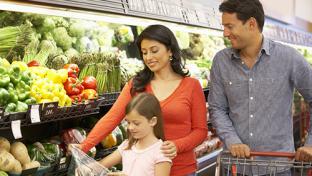Retail Vaccination Push Could Help Spark Spending
The ongoing vaccination rollout in the U.S. — an effort supported in large part by retailers — will help spark more consumer spending this year, and lead to year-over-year retail sales growth of between 6.5% and 8.2%, according to the National Retail Federation (NRF).
Its latest annual forecast predicts retail spending of more than $4.33 trillion this year — a year when all hopes are focusing on getting back to some type of normal, a situation that leads to more retail revenue and other good economic news. The NRF report adds reason for cautious but solid optimism about those issues.
“Despite the continuing health and economic challenges COVID-19 presents, we are very optimistic that healthy consumer fundamentals, pent-up demand and widespread distribution of the vaccine will generate increased economic growth, retail sales and consumer spending,” NRF President and CEO Matthew Shay said. “From the outset of the pandemic, retailers have gone above and beyond even the most conservative safety guidelines to protect and serve their associates and consumers alike. Retailers are increasingly engaged in working with federal, state and local health officials to distribute and administer the vaccine. This partnership has been key to our economic health throughout the pandemic and will continue this year.”
Early results from the trade group show that retail sales in 2020 grew 6.7% over 2019 to $4.06 trillion, nearly doubling NRF’s forecast of at least 3.5% growth, which did not account for the impact of a global pandemic. This figure compares with 3.9% growth in 2019. Online and other non-store sales, which are included in the total figure, skyrocketed to 21.9% to $969.4 billion as consumers shifted to e-commerce. The numbers exclude automobile dealers, gasoline stations and restaurants.
NEW RETAIL VACCINATION EFFORT
As many food retailers open their pharmacy doors to vaccinations — which in turn can lead to more store traffic, of course — other merchants are pushing pandemic protections in other ways as consumers and store operators strive to achieve a post-COVID normal. Walmart provides one recent example.
The retail chain has launched a program centered around creating a series of community events to administer the COVID-19 vaccine across the country. Centers for Disease Control and Prevention (CDC) is providing Walmart with allocation of the vaccine for this new effort, which Walmart is launching in partnership with local community leaders and nonprofit organizations.
These new events mark an expansion of Walmart’s role with the Federal Retail Pharmacy Program and are supplementing Walmart’s ongoing vaccination program at more than 1,400 pharmacies nationwide in 35 states, Puerto Rico and Washington, D.C., through federal and state efforts.
“We have two goals as we administer vaccines: first, to reach as many people as possible to enable reopening efforts, and second, to ensure equitable vaccine distribution across the communities we serve. We have focused most of our events in medically underserved neighborhoods, and we are proud to play a part in increasing access to the vaccine in these communities,” said Dr. Cheryl Pegus, Walmart’s EVP, health and wellness. “We will continue to engage within our communities to find new ways to reach additional customers with our vaccination programs as we work towards the eventual end of the pandemic.”
BROADER RETAIL TRENDS
As for the broader U.S. retail situation, NRF forecasts that 2021 retail sales are estimated to total between $4.33 trillion and $4.4 trillion. Online sales, which are included in the total, are expected to grow between 18% and 23% to between $1.14 trillion and $1.19 trillion.
NRF expects the overall economy to gain between 220,000 and 300,000 jobs per month in 2021, depending on the pace of the overall economy in the second and third quarters. Despite the economy’s stalled momentum at the end of last year, NRF forecasts real GDP growth between 4.5% and 5.0%.
“The trajectory of the economy is predicated on the effectiveness of the vaccine and its distribution,” NRF Chief Economist Jack Kleinhenz said. “Our principal assumption is that that the vaccination will be effective and permits accelerated growth during the mid-year. The economy is expected to see its fastest growth in over two decades.”
Kleinhenz noted that this year marks the second year of savings, record high stock valuations, increased home prices, enhanced government support and record low interest rates, which are all contributing factors towards the economy and consumer spending behavior.
Additionally, Kleinhenz said households will still consume retail goods but will turn to services as they are able, which normally account for 70% of consumer spending. While the pandemic has precipitated broader adoption of multichannel services for the retail industry, households are becoming attached to the convenience and product selection of buying online, the trade group said.
Bentonville, Ark.-based Walmart operates more than 11,300 stores under 56 banners in 27 countries, and e-commerce websites, employing 2.2 million-plus associates worldwide. Walmart U.S. is No. 1 on The PG 100, Progressive Grocer's list of the top food and consumables retailers in North America, while Walmart-owned Sam's Club ranks No. 9 on the list.



